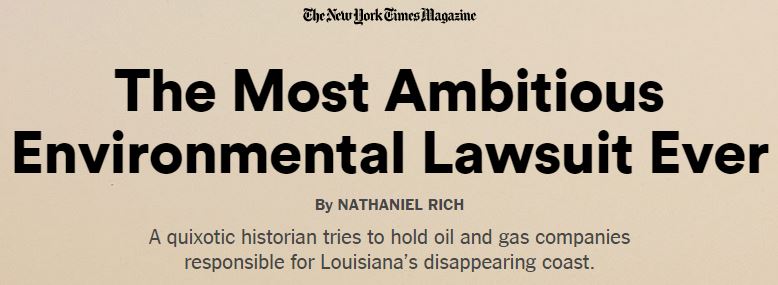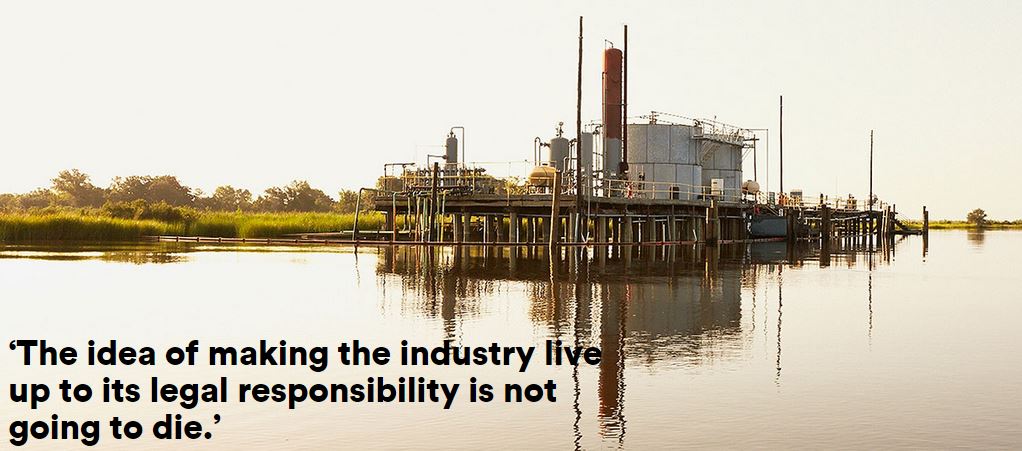The Most Ambitious Environmental Lawsuit Ever by Nathaniel Rich, October 2, 2014, New York Times
The lowest section of the Mississippi River Delta looks like a maple leaf that has been devoured down to its veins by insects. The sea is rising along the southeast coast of Louisiana faster than it is anywhere else in the world.
…
Beneath the surface, the oil and gas industry has carved more than 50,000 wells since the 1920s, creating pockets of air in the marsh that accelerate the land’s subsidence. The industry has also incised 10,000 linear miles of pipelines, which connect the wells to processing facilities; and canals, which allow ships to enter the marsh from the sea. Over time, as seawater eats away at the roots of the adjacent marsh, the canals expand. By its own estimate, the oil and gas industry concedes that it has caused 36 percent of all wetlands loss in southeastern Louisiana.
…
The oil and gas industry has extracted about $470 billion in natural resources from the state in the last two decades, with the tacit blessing of the federal and state governments and without significant opposition from environmental groups. Oil and gas is, after all, Louisiana’s leading industry, responsible for around a billion dollars in annual tax revenue. Last year, industry executives had reason to be surprised, then, when they were asked to pay damages. The request came in the form of the most ambitious, wide-ranging environmental lawsuit in the history of the United States. And it was served by the most unlikely of antagonists, a former college-football coach, competitive weight lifter and author of dense, intellectually robust 500-page books of American history: John M. Barry.
…
Barry concluded that just as in 1927, people died because of cynical decisions made by shortsighted politicians drawing on bad science. For Barry, Hurricane Katrina was not the story of a natural disaster; it was a story of politics, science and power.
…
In Washington, where Barry lives for part of the year, he met with a freshman representative from the state’s First Congressional District, which includes much of southeastern Louisiana: Bobby Jindal. He begged Jindal to demand action from the White House. New Orleans couldn’t count on its mayor, or on the governor, he said; the city needed a hero on Capitol Hill. After speaking for two hours, Barry recalled, Jindal said that taking a leadership position on Hurricane Katrina “didn’t fit his timing for running for governor.” (Jindal, who declined to comment for this article, was elected governor in 2007.) “I left in total disgust,” Barry said.
Barry has a special talent for disgust. His face at rest conveys a pained forbearance. A lifetime spent studying the behavior of powerful people motivated by low ambitions has made him quick to skepticism. He is a master of winces, grimaces and exasperated smiles. His voice is gravelly and low, though indignation amplifies it fivefold.
…
It soon became clear to Barry that despite its grand mission, the board was, as its president, Stephen Estopinal, liked to joke, an “authority without any authority.”
…
The state did have a plan in place to rebuild the barrier islands and coastal wetlands. …
The state, however, had not figured out how it was going to finance the Coastal Master Plan. The main source of funding would be the settlement from the BP Deepwater Horizon oil-spill lawsuits, which is expected to be as much as $20 billion. That would leave about $30 billion. … Barry believed that other oil and gas companies should also contribute. His argument was simple: Because the industry conceded responsibility for 36 percent of land loss, it should pay its part: $18 billion would be a start. The industry, unsurprisingly, preferred that the master plan be funded by taxpayers.
…
After consulting with legal experts, Barry became convinced that most companies never filled in their canals and that the state had failed to enforce the law.
…
“The reality is that our case is overwhelming,” Barry told me. “You look at the photographs of the damage, and you say, What the heck?” (This and the following quotation are paraphrases; indignation not only raises the volume of Barry’s voice, it also makes his language unfit for print.) “Are you out of your mind? They violated the terms of their contract. They broke the law!”
…
The academic centers and environmental groups Barry contacted, while sympathetic to the cause, lost interest when they estimated how many millions of dollars would have to be spent on expert witnesses and coastal surveys. “We didn’t only need legal ability,” Barry said. “We needed the resources to take on Exxon, Shell, Chevron and BP — all at once.”
He compiled a list of private lawyers who have had success bringing major environmental lawsuits. It was a very short list. The first name on it was Gladstone N. Jones III, an attorney based in New Orleans who in 2006 won the largest judgment against the oil industry in the history of Louisiana: $57 million in damages for pollution and marshland loss caused by ExxonMobil. Jones, who resembles a midcareer Fred Gwynne and has the deep, cajoling voice to match, didn’t need to think long about taking the case. “It’s a pretty easy one to try, because the damage is so clear,” he told me. “I’ve never had a case where the industry acknowledges damage in their own papers. The science is irrefutable. The cause is irrefutable. The oil companies didn’t fill in the canals. Why? Because it cost money.”
…
This March, the battle over the levee board’s lawsuit moved to Baton Rouge, where the Louisiana Legislature was entering session. Jindal appeared fixated on having the Legislature produce a bill that would kill the lawsuit before the courts could adjudicate it. But to do so, the bill would have to eliminate the right of the levee board to file a lawsuit in the first place. The bill would also have to go into effect retroactively, because the suit had already been filed.
…
But soon after the lawsuit was announced, Jindal, who is widely expected to run for the Republican presidential nomination in 2016, indicated that he would go to unusual lengths to ensure that a settlement would never be negotiated. The nine-person levee board had been designed to gather experts and insulate them from political meddling. Now Jindal declared that he would refuse to appoint any candidates who supported the lawsuit.
…
….within days of being replaced on the board, he created his own nonprofit group, Restore Louisiana Now. Its mission was to “[preserve] the lawsuit and [prevent] opponents from getting the Legislature to intervene in what should be a court process.”
…
There are 105 seats in the Louisiana House of Representatives and 39 seats in the Senate. During the term, about 70 lobbyists from the oil and gas industry were in the legislative chambers. They worked in concert with the governor’s staff to secure support for a bill that would void the lawsuit.
…
The intensity of the industry’s lobbying effort seemed to be backfiring, rousing the suspicion of some legislators, particularly those who were practicing lawyers.
…
“You could feel the weight coming down,” Barry said. “You could see them getting peeled off one at a time, through threats or promises. It was disheartening.”
…
But many of these legislators also live in coastal parishes and have watched for years as the lands they represent steadily disappeared.
…
As Barry said: “The idea of making the industry live up to its legal responsibility is not going to die.”
The lawsuit, however, might. Gladstone Jones has requested that a federal judge rule on whether the bill signed into law by Jindal is constitutional and indeed restricts the lawsuit from proceeding. Judge Nannette Jolivette Brown of Federal District Court will hear that motion, along with motions filed by energy companies to dismiss the suit, on Nov. 12.
…
[Emphasis added]


